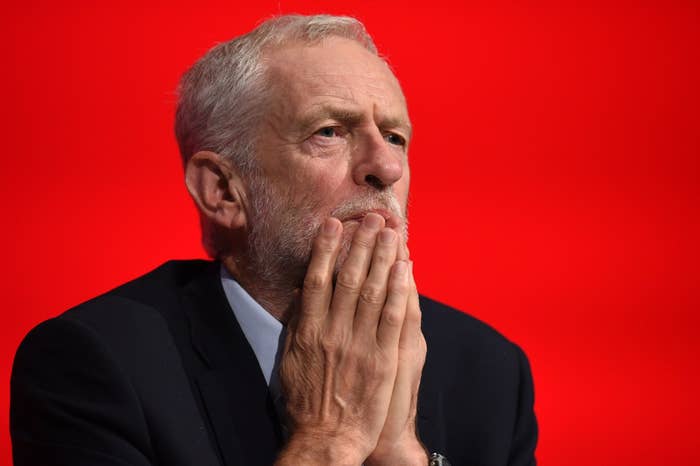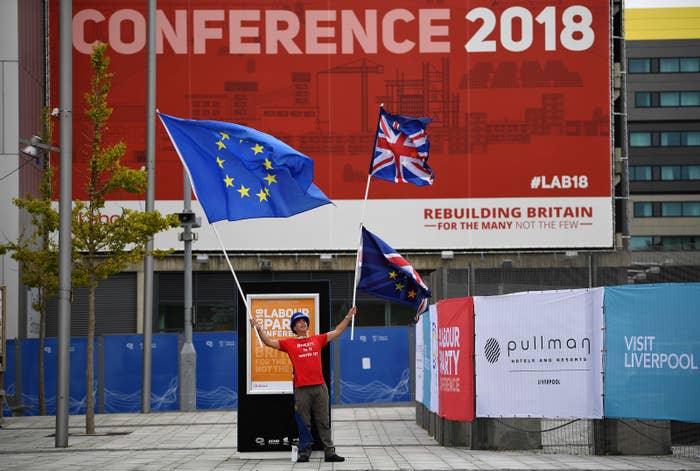
Many of those arriving at Labour’s party conference in Liverpool this week had one thing on their minds: Brexit. Westminster journalists, Remain-supporting Labour moderates and even some in the shadow cabinet believed the internal row over a people’s vote was the only story that really mattered, and the one issue Jeremy Corbyn didn’t want to talk about. For the Labour leader’s inner circle, however, this conference was indeed meant to be about Brexit.
BuzzFeed News has spoken to several advisers close to the Labour leader who revealed the real strategy behind the conference and his speech today. They say that the last three days have been all about defining his approach to Brexit – but just in a very different way to what everybody thought.
Corbyn’s inner circle were privately perfectly happy for journalists and MPs to obsess about the wording of party motions on another public vote. They knew the Conservatives would frame their attacks on Labour’s Brexit position rather than its domestic policies, on which they believe the Tories have nothing to say. And they calculated that few people outside Westminster and London would care about reports of confusion surrounding Labour’s position on a second referendum, something that is still a long way off happening anyway.
They also judged that the ambiguity and internal machinations would occupy lobby journalists and moderate MPs. They were right. With potential troublemakers distracted, it meant Corbyn could focus on what Brexit means for him.
The unspoken theme of this year’s conference and today’s speech, according to senior Corbyn aides, is to deliver control to working class Leave voters who feel angry at the establishment and disenfranchised by the political elite. The same people who would likely be turned off Labour were it led by someone campaigning to stop Brexit, Corbyn sees as fundamental to winning the next election.
Remain-supporting Corbyn critics often accuse the lifelong Eurosceptic of being a secret Leave voter. Corbyn has always insisted he voted Remain, but few who understand his analysis of why so many voted to Leave could doubt that he gets Brexiteers’ concerns better than many other politicians in Westminster.
For Corbyn and his team, Brexit is not about just leaving the European Union. It is about how working class voters, largely in towns and communities across England, felt the control they had over their lives has been taken away from them over the last forty years, in particular under the Thatcher and Blair governments.
The Labour leadership thinks this mood presents a huge opportunity. Corbyn’s team has recognised the potency of Vote Leave’s “take back control” mantra. While they did not want to be so crude as to copy it, everything they planned for this conference was based around that theme, and aimed at those Leave voters who feel neglected by the establishment.
On Wednesday, Corbyn will use his conference speech to commit to ending what he will call “greed-is-good, deregulated financial capitalism”, and unveil new policies on creating 400,000 new green jobs and the radical expansion of universal free high quality childcare. These ideas may not seem much to do with Brexit, though for Corbyn they are intrinsically linked.
The raft of conference policy announcements - which as BuzzFeed News reported yesterday received widespread media coverage - were all rooted in this theme of control. Labour has waged a high-profile campaign in defence of the UK’s ailing high streets, with new policies on free wifi in town centres and an end to ATM charges being well-received, and the party looking at free car parking next.
“What better imagery is there than boarded up high street shops to show how communities have lost control and been hurt by a lack of investment,” a senior Labour aide told BuzzFeed News.
The new announcements on expanding democracy in the economy with a share ownership plan for employees and workers on boards were inspired by the Brexit theme of control, Labour advisers said. As were the suggestion the party could scrap universal credit and the childcare and jobs investment policies in Corbyn’s speech. “If you look at all these policies,” the Labour adviser said, “They are all based on giving people back the control over their lives that they have lost over decades”.
Some months ago, a decision was made internally to move Labour’s messaging away from talking about communities that have been “left behind”. Instead Labour spokespeople were instructed to describe them as "held back", to make clear that these voters were let down as an active decision of successive governments. This was a deliberate strategy to recognise and reflect the anger disenfranchised voters feel towards the political class, and what Corbyn calls the “rigged system”.

The graphics displayed around the conference centre show industrial imagery, targeting a “held back” workforce with the theme of “rebuilding Britain”. Corbyn’s spokesman told reporters ahead of his conference speech that a Labour government would reject the trickle-down economics which it believes has failed these voters, and reorganise it radically to give control back to workers.
After using the word “radical” eight times in 15 minutes to describe Labour’s new plans, Corbyn’s spokesman laughed when the journalists’ questioning turned straight back to their favourite topic of Brexit.
Some Conservative MPs fear that while their own party is in a sorry state over the Brexit negotiations now, things will only get worse for them after the UK leaves the EU. With Brexit done, one way or the other, these Tories believe the simple act of leaving will gain their party few rewards with Brexit voters.
Without a policy platform that speaks to why people voted Leave, these Tories fear they will leave a vacuum to be filled by Labour. They compare it to the election after the Second World War, when Churchill’s Tories were beaten by Attlee’s Labour.
This is an analysis shared by Corbyn’s aides. They believe that while the Tories focus entirely on Brexit and offer next to nothing in terms of domestic policy, Labour can speak to those Brexit voters who wanted more than to simply leave the institutions of the EU.
A telling moment was Team Corbyn’s decision to ask Theresa May about buses at Prime Minister’s Questions in July. Westminster journalists bemoaned the Labour leader’s failure to grill the PM on Brexit. Tory backbenchers howled with derision. But Corbyn’s office knew they were talking about an issue that matters more to working class Leave voters than some complex minutiae about the Brexit process.
Labour aides are more confident than ever, buoyed by polls suggesting their message is cutting through to its target audience. They increasingly believe that after eight years of austerity, voters’ views on public services, investment and the type of economy they want have aligned with them, and away from the Tories.
Corbyn’s nationalisation policies, monstered by Conservative HQ and in the Tory press, are consistently popular with voters. A YouGov poll found 54% of voters back Labour’s new share ownership policy, with just 17% opposed.
The “control” message to Leave voters in Corbyn’s speech this afternoon and Labour’s conference this week has been relatively subtle, as political messaging goes. But Labour aides are confident they were right to reckon that while Corbyn’s enemies made a lot of noise about a conference motion on Brexit, the party leadership would be able to actually speak to those who voted for Brexit itself.
And as the political class found out in the referendum, it is those disenfranchised voters who feel angry at the way the country has been run for decades who can deliver a political earthquake.
